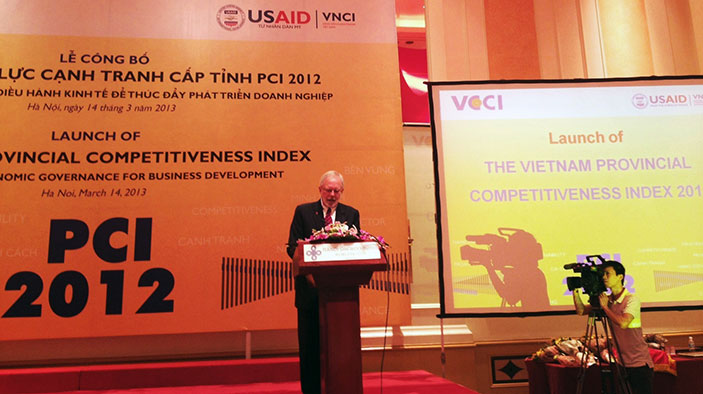Eighth Provincial Competitiveness Index Gains Wide Support in Vietnam
March 14, 2013
More than 500 business and government leaders from Vietnam’s 63 cities and provinces gathered March 14 in Hanoi for the launch of the 2012 Provincial Competiveness Index (PCI).
The ceremony was chaired by Vietnam Chamber of Commerce and Industry (VCCI) Chairman Dr. Vu Tien Loc and U.S. Ambassador David Shear.
PCI 2012 reflects the responses of more than 8,000 Vietnamese enterprises to a survey on provincial governance. It provides a rigorous analysis of economic governance and the regulatory environment in each of the country’s 61 provinces and five centrally managed cities, and sheds light on why some provinces show stronger private sector growth and dynamism relative to their neighbors.

The annual index, now in its eighth year, was developed by VCCI and the U.S. Agency for International Development (USAID)’s Vietnam Competitiveness Initiative project, which is implemented by DAI.
Corporate partners for the event—including the European and American chambers of commerce—emphasized the importance of the PCI and of improving economic governance to the foreign and domestic business communities.
As part of the launch ceremony, VCCI and VNCI held two events: A presentation of awards from the Vietnamese business community to recognize efforts by provincial authorities to improve the business environment of high-performing and reforming provinces; and a presentation of key findings from the third annual survey of 1,540 foreign invested enterprises in 61 provinces.
This year’s overall index included several surprises. Historically strong performers Binh Dinh and Vinh Long re-emerged as top players after falling in the rankings in the 2011 index. Dong Thap and An Giang, both Mekong Delta provinces, led the rankings. Perennial top performers, such as Binh Duong and Danang, fell in this year’s rankings.
Like its predecessor surveys, the PCI 2012 provides insight into governance areas that need improvement. In particular, firms registered increased dissatisfaction with expropriation risk and the difficulty of receiving land compensation prices in line with market value, less confidence and use of provincial legal institutions, and limited use—and less satisfaction with the supply and quality of—business support services.
In his remarks, Ambassador Shear said, “The PCI continues to contribute to economic governance and the ease of doing business in Vietnam. I am confident this year’s report will foster new commitments by provincial and national authorities to improving economic governance for the benefit of all the people of Vietnam.”
RELATED CONTENT:
DAI’s Joe Abah Speaks on the Nigeria 2023 Elections at EUSDGN Project Event
The European Union Support to Democratic Governance in Nigeria project recently formally closed out its first phase and hosted a launch of its second phase which runs through 2027. The event was both a discussion of accomplishments from the project’s first phase and an opportunity to share plans for the second phase.
Read More